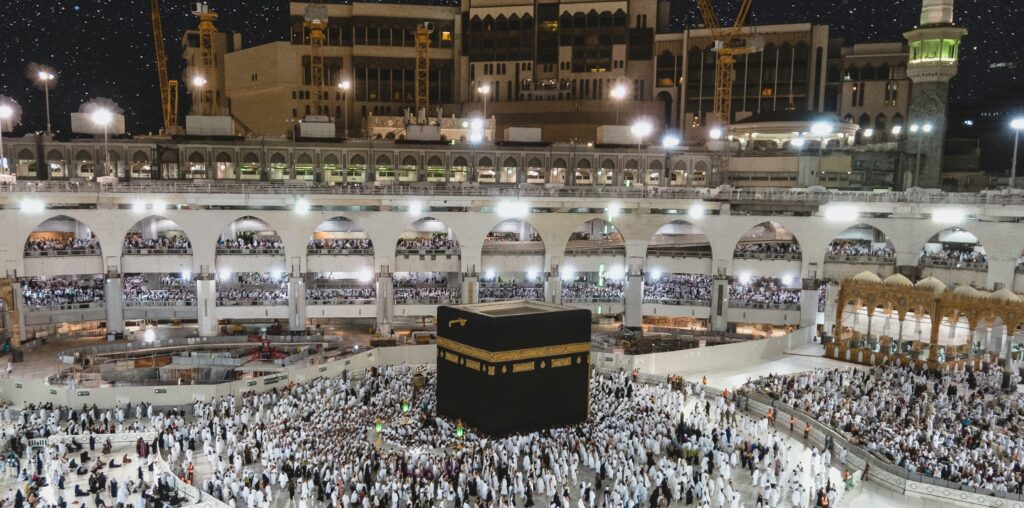Hajj and Umrah are significant pilgrimages for Muslims. Both involve travelling to Mecca and performing specific rituals, yet they differ in timing, practices, beliefs, and significance. Hajj is a mandatory pilgrimage with complex rituals at specific times, while Umrah is a voluntary pilgrimage with simpler rituals that can be performed anytime. Understanding these distinctions is crucial for Muslims undertaking these journeys. This blog will help you discover the key difference between Hajj and Umrah.
Define Hajj
Hajj is a beautiful journey and one of the five pillars of Islam. It represents a religious duty for Muslims. Every Muslim who is physically and financially able is encouraged to perform Hajj at least once in their lifetime. This special event takes place annually during the Islamic month of Dhul-Hijjah, the twelfth month of the Islamic lunar calendar. The pilgrimage itself unfolds over several days, filled with rich traditions and heartfelt rituals in which everyone eagerly participates. Here are some of the key rituals that make this experience so profound:
- Ihram: This sacred state of spiritual purity is warmly embraced by every Muslim before starting their meaningful pilgrimage.
- Tawaf: With deep affection, pilgrims circle the Kaaba, completing seven heartfelt laps around this holiest site in Islam.
- Sa’i: As part of their touching journey, pilgrims walk back and forth seven times between the hills of Safa and Marwah, reflecting Hagar’s earnest search for water for her beloved son, Isma’il.
- Standing at Arafat represents the true essence of Hajj, as pilgrims come together in earnest prayer on the plain of Arafat, sincerely seeking forgiveness.
- Animal Sacrifice: Pilgrims take part in the meaningful act of animal sacrifice to honor Prophet Ibrahim’s unwavering devotion as he prepared to sacrifice his son Isma’il in obedient love for Allah.
- Shaving the Hair: This beautiful moment marks the joyful conclusion of all rituals.
Define Umrah
If you are performing Umrah in Ramadan, you can enjoy double rewards. While Hajj is obligatory, Umrah is a voluntary pilgrimage that Muslims can perform at any time of the year, except during the days of Hajj. Umrah is shorter and involves fewer rituals compared to Hajj. However, it is still an important spiritual practice for Muslims.
- Ihram: Just like in Hajj, pilgrims embrace a spiritual purity before embarking on their pilgrimage journey.
- Tawaf: As part of this sacred experience, pilgrims joyfully walk seven times around the Kaaba, moving in a gentle counterclockwise direction.
- Sa’i: Pilgrims also venture between the hills of Safa and Marwah, mirroring the steps taken during Hajj.
- Shaving or Trimming the Hair: After finishing the Tawaf and Sa’i, pilgrims take a moment to either shave their heads or trim their hair, symbolizing their purification and new beginnings.
What Are The Differences Between Hajj And Umrah?
The difference between Hajj and Umrah lies in the timing and scale. Unlike Hajj, which is performed on specific days during Dhul-Hijjah, Umrah can be performed at any time of the year, making it more accessible to Muslims. Additionally, Umrah is shorter and involves fewer rituals, taking only a few hours to complete.
| Hajj is obligatory for every capable Muslim at least once in their lifetime, whereas Umrah is voluntary. |
| Hajj includes more complex rituals such as the Standing at Arafat, animal sacrifice, and specific actions on set days. |
| Hajj takes place in the month of Dhul-Hijjah, while Umrah can be performed at any time. |
| Hajj spans several days, while Umrah can be completed in a few hours. |
| Both experiences are fulfilling, but Hajj holds a deeper spiritual significance than Umrah. |
Is There Significance In Performing Umrah During Ramadan?
Completing Umrah during Ramadan is strongly recommended because it is believed to yield greater rewards. A Hadith mentions that performing Umrah in Ramadan is equivalent to carrying out Hajj. Ramadan, characterized by fasting, prayer, and charity, enriches Mecca’s spiritual ambiance, drawing millions for worship. The experience of undertaking Umrah offers both physical and spiritual benefits, as well as the opportunity for sin forgiveness. Although Umrah can be done at any time, its importance is heightened in Ramadan, making the experience remarkable due to the significant crowds during this period.
Conclusion
Hajj is a religious duty and a profound spiritual experience fostering unity and equality among Muslims. It requires physical, emotional, and financial commitment and yields significant rewards here and in the Hereafter. The difference between Hajj and Umrah lies mainly in their obligation, rituals, and timing. Both hold great significance for Muslims and offer immense spiritual rewards. Performing Umrah during Ramadan is especially revered for its combined spiritual benefits of the pilgrimage and fasting.




